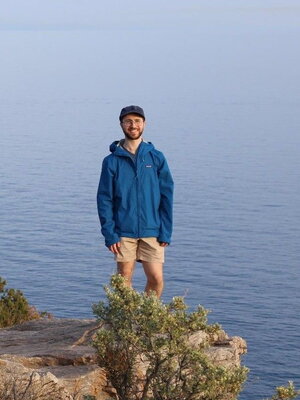
Meet Benjamin Zavell (BS, '22, history and earth, society, & environmental sustainability) an analyst at Invenergy, a renewable energy developer in Chicago, Illinois. Zavell double majored in history and earth, society, & environmental sustainability at the University of Illinois and completed a master's degree in energy and sustainability at Northwestern University. For Zavell, his majors were the perfect combination to prepare him for a future working in clean energy. He credits his history degree with teaching him critical reading, writing, and analysis, and giving him the storytelling skills that he said are crucially needed in clean energy work. Read on for a Q&A to learn more about his career.
Why did you decide to pursue a degree in history?
I decided to pursue a degree in history because I originally planned on becoming a high school history teacher. After taking AP European History my senior year of high school, I knew the value of learning history was becoming ever more important. As my college experience continued, I remained fascinated with some of the topics and eras of history the department had to offer, including Modern France (shoutout Dr. Chaplin!).
Did you double major or minor in any other fields while attending the University of Illinois? How did they complement your studies in history?
I double majored in History and Earth, Society, and Environment Sustainability (ESES), both based in the College of Liberal Arts. I knew I wanted to pursue a career in environmental stewardship/clean energy, so targeting an additional degree more closely related to that area was important. The benefit of pursuing multiple majors within the College of Liberal Arts was that many of the core requirements overlapped, allowing me to focus my efforts on the advanced coursework. Having a background of studying history complemented the ESES degree because it taught me the skills required to read and understand complex information and be able to summarize and communicate it effectively to classmates and colleagues.
Did you pursue higher education after undergrad?
Upon graduation, I began my master's degree at Northwestern University, where I earned a Master of Energy and Sustainability from the School of Engineering. This Master's degree was the perfect bridge from my more general undergraduate degree to the work I do today. Similar to how my undergraduate degrees were complementary to each other, my history background helped me get through thousands of pages of reading and research papers required for the degree. Having a history degree also shaped my ability to shift from one topic to another while still internalizing key details necessary to succeed in technical coursework.
What was your first job after college?
My first job after college, not including graduate school, was as a Hydrogen Shot Fellow at the U.S. Department of Energy in Washington, D.C. In that role, I supported the Hydrogen and Fuel Cell Technologies Office with different analyses to support tax credit rulemaking and other key initiatives.
What is your current career and how does your degree in history inform your work?
I currently work at Invenergy, a Chicago-based renewable energy developer, on the origination team. My degree in history has become more relevant in this role as I am actively developing and writing complex proposals that require skills one can learn while earning a degree in history. If there is anyone considering a role in the clean energy space, know that the skills learned with a history degree will take you far!
What do you enjoy about your work?
I greatly enjoy the significant impact I can have in relation to two items. First, I get to work on some of the largest infrastructure projects currently being built anywhere in the world. Second, I know I am impacting thousands of people daily by adding more electricity to the grid and keeping their lights on.
What does a typical workday look like for you? Also, what is an example of the most interesting aspect of your job?
My day-to-day varies significantly. From reviewing and responding to RFPs (Request for Proposals) from utilities and other customers to organizing internal meetings with subject matter experts, my day is always unique. Working in the clean energy space, I am always learning something new from my colleagues, whether that is about a new technology we are exploring or why a strategic decision was made.
What advice do you have for students interested in pursuing work in your field?
The clean energy field has a place for anyone and everyone! I work with people with all sorts of backgrounds, including engineering, economics, business, history, law, and so much more. The skills a degree in history provides can be transferred into any field, and is becoming ever more necessary in the clean energy space where strong storytellers are needed.
What is your proudest achievement?
Meeting and marrying my now wife I met on campus back in 2019!